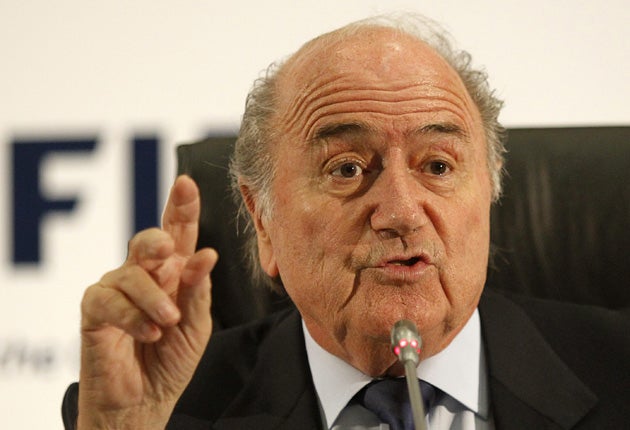Blatter claims South Africa World Cup a success, but do the numbers add up?

Your support helps us to tell the story
From reproductive rights to climate change to Big Tech, The Independent is on the ground when the story is developing. Whether it's investigating the financials of Elon Musk's pro-Trump PAC or producing our latest documentary, 'The A Word', which shines a light on the American women fighting for reproductive rights, we know how important it is to parse out the facts from the messaging.
At such a critical moment in US history, we need reporters on the ground. Your donation allows us to keep sending journalists to speak to both sides of the story.
The Independent is trusted by Americans across the entire political spectrum. And unlike many other quality news outlets, we choose not to lock Americans out of our reporting and analysis with paywalls. We believe quality journalism should be available to everyone, paid for by those who can afford it.
Your support makes all the difference.It's official: even with four games to play the World Cup in South Africa can be declared a success. Sepp Blatter, Fifa's president, yesterday offered his judgement on the tournament and, unsurprisingly, it was positive. "We are giving hope to the world that perhaps through football we can become better human beings," said Blatter in Johannesburg.
His proclamation came on the same day that the organisers said they would meet the forecasts for visitor numbers at the finals. With fears that the event would be dogged by crime and scant attendances largely failing to be realised, the first World Cup on African soil does appear on course to be judged a relative success. Some games have been poorly attended, despite Fifa claims of high ticket sales – the best since US '94 – while many of the early matches were notable for their lack of incident amid mounting criticism of the ball and some of the officiating.
Blatter said: "More than 500,000 fans will have come to South Africa and some are talking about the figure being even higher. The forecast from "old Europe" was the fans wouldn't come – well here they are. I am a very happy president and I hope I will be happy until the very end of this week."
The sight of Angela Merkel, Germany's beleaguered Chancellor, enjoying her country's stunning triumph over Argentina in Cape Town at the weekend has provided Blatter, never one to downplay his organisation's perceived achievements, with further fuel. "There is a political dimension to football too – how many heads of states have come to visit South Africa? And they all want to make sure they have pictures taken in the stands. That's the power of football," he said. "Football gives emotions in this deranged world. Look at the news and you see the world appears to have suddenly stopped and the TV cameras will after 12 July be used everywhere else in the world."
But does Blatter's belief in the success of the tournament add up?
Have the fans travelled?
The organisers spent the weeks preceding the start of the tournament reining in expectations over visitor numbers, and now that they are claiming to be well on course to hit their target it has to be judged accordingly. Organisers estimate that 450,000 supporters will have gone to South Africa, compared to a million in Germany four years ago and 250,000 in Japan and South Korea in 2002. Less satisfying have been the numbers from the rest of Africa, with only 10,000 having travelled.
Verdict: Satisfactory, especially given pre-tournament fears and the economic climate.
Has crime had an impact
There have been 316 World Cup- related arrests according to figures released by the South African Police Service last week. Around a third of them have been foreigners. Most of the arrests have been for theft, with very little violent crime reported against visiting fans. The organisers' claims that foreign media had exaggerated safety fears pre-tournament have largely been proved correct.
Verdict: A real success story.
Has it benefited the local economy?
This is the most difficult one to answer. There has been a short-term fillip through tourism, although not as much as had been originally hoped for. South African government figures estimate it will bring in 10 times as much as has been spent on advertising the tournament and the country around the world. But the overall cost of staging the event is believed to be around £3bn and whether the lasting benefits of an improved infrastructure and a number of shiny new stadiums balance that remains to see.
Verdict: Unproven.
Has anyone been watching?
Television audiences around the globe have been strong. Brazil drew an average of 46 million viewers per game, while it is estimated 80 per cent of those watching television in Japan during their last 16 match against Paraguay were tuned in to the game. In the UK, England attracted a peak of over 20 milion viewers for their first two games and slightly less for their last two.
Verdict: The figures are on a par with previous tournaments.
And what about the football?
The unpredictable Jabulani ball, controversial officiating and an overly cautious opening round make up the negative column, with the Germans doing their best to balance it up.
Verdict: Ask again on Sunday night.
Join our commenting forum
Join thought-provoking conversations, follow other Independent readers and see their replies
Comments